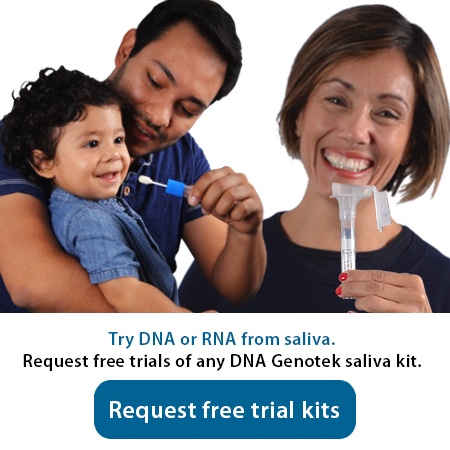2018-10-09
Genetic epidemiology, the study of how genetics contribute to health and disease in families and populations, seeks to derive a statistical analysis of how genetics works in large groups. It therefore requires enough DNA samples from a given population to reduce the effect of outliers and ultimately, determine objective truths.
The more samples that are required, the more complex and costly the study. Researchers are taxed with finding the right sample size and study design to demonstrate credibility without breaking their budgets.
Optimizing genetic samples from collection to analysis will enable highly efficient study management and strong downstream analytics.
DNA Genotek has extensive experience working with genetic researchers over the past 15 years on both sample and study management. In working with researchers conducting a broad spectrum of projects, we have observed the following top 10 essential considerations when designing and executing large-scale sample collection for genetic research.
1. Non-invasive, easy collection increases compliance.
DNA collection needs to be fast, easy and painless to maximize donor compliance and achieve large sample cohorts. Compliance can be augmented by tailoring collection instructions (i.e. larger font, simplified language), offering translations and/or incorporating how to videos. Some collection scenarios may also benefit from offering assisted or supervised sampling. Saliva is a proven method to easily collect large amounts of DNA that performs equivalent to blood in downstream analysis (when stabilized to maintain high molecular weight).
2. Accessible donation maximizes recruitment.
In large-scale sampling, recruitment is key. The easiest way to recruit large numbers is to collect where your donors are - in a clinic, in a remote field location, at an event or in the comfort of their own home. The sample collection process must be optimized to reach your donor population in their setting. For example, sample kits may require custom configurations (ex. family vs. individual collection, child vs. adult), assembly, tracking, shipping and/or storage capacity. To avoid the cost of a warehouse operation, consider outsourcing to a company to handle these assembly and logistical demands.
3. Motivated donors donate.
Engage your donors. Explain the purpose of your research and how donors will help you achieve these goals. Offer incentives when necessary to further motivate donors.
4. Research that looks important gains importance.
Market your study. Give your project a name and a brand - develop imagery to reflect your unique mission. Create a collection package (i.e. sample kit(s), user instructions, and other support material) that positively engages the donor and reflects the goals of your study. Consider creating a project website where donors can learn, sign up to participate and request their own DNA sample collection package.
5.Standardized collection delivers consistent and reliable results.
Evaluate sample collection methods with your study population at every collection site. Identify high-risk sub-populations and determine the collection method that accommodates all donors. Ensure collection instructions are communicated and followed.
6. High quality samples achieve high quality results.
A critical factor in any study, regardless of size, is the quality and reproducibility of results. Sample integrity at the point of collection sets the limits for analysis downstream. Maintaining sample integrity through transport, storage and processing is equally critical in producing reliable results. Select a sample method that ensures that high quality DNA is immediately stabilized and protected until laboratory processing. An increasing number of labs and studies are moving to sequencing platforms – which are significantly more complex than PCR and SNP genotyping. These platforms require DNA of high molecular weight.
7. Sample transportation can be fast, affordable and easy.
To save time, money, and complexity during transport to the processing laboratory, choose a collection method that stabilizes DNA at ambient temperature. Consider efficient outer packaging to reduce shipping costs and ensure your samples have the appropriate regulatory clearances to ship easily, whether nationally or internationally.
8. Strong sample traceability delivers integrity and accountability.
Be prepared to reference the collection, transfer, receipt, analysis, storage and disposal of all samples. Barcodes for donor traceability offers a scalable solution and they should be placed on sample vials as well as any connected paperwork.
9. Scalable laboratory techniques power efficiency.
Consider a sample type that can integrate easily into automated high-throughput processing for rapid downstream analysis. Long-term DNA stabilization is critical when considering how and where to store your unprocessed samples. Ambient temperature storage does not require freezer space and is very cost effective.
10. Research is collaborative.
Ask for help. Select a supplier that has process, quality and regulatory experience to guide you through best practices and achieve your study results.
DNA Genotek specializes in sample management – from study design and logistics, easy sample collection, immediate sample stabilization, efficient transport/storage and sample processing, to comprehensive lab services and interpretation. Researchers looking for expertise and support in large-scale sample collection, can find proven solutions with DNA Genotek.


